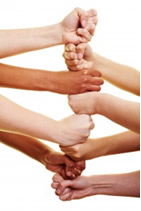 |
Dan Oswald, CEO of BLR®, offered his thoughts on teamwork in a recent edition of The Oswald Letter.
Teamwork is defined as a “cooperative or coordinated effort on the part of a group of persons acting together as a team or in the interests of a common cause.” That certainly applies to business as well as sports.
So what does it mean for a group to function as a team? What should the expectations or terms of engagement be for a team? Here are a few elements I think are crucial for a group to function as a team.
Common Goal
If you look back to the definition of teamwork above, you’ll see it refers to a common cause. Whatever you want to call it, a team must have a shared purpose and goal the members are working toward together. Without a common goal, the team has no focus. Whether it’s an increase in market share, a successful product launch, or the implementation of a new process, there must be something that binds the group together and provides the incentive and opportunity to act in concert to achieve something none of them could do alone.
In sports, it’s easy to find that common goal. In the NFL, it’s winning the Super Bowl. Every member of every team shares that goal at the beginning of each season. It doesn’t matter if you’re on offense, defense, or special teams. It doesn’t matter if you’re a starter or a backup. It doesn’t matter if you’re a player, a coach, or another staff member. Every person in the organization is focused on winning the Super Bowl. At least they are if the organization wants to succeed.
Compensation.BLR.com, now thoroughly reved with easier navigation and more complete compensation information, will tell you what’s being paid right in your state—or even metropolitan area—for hundreds of jobs. Try it at no cost and get a complimentary special report. Read more.
Open Debate and Discussion
For a team to work well together, there must be free and open communication. That means honest discussion and debate among the team members about the processes, procedures, goals, and objectives of the group. And yes, open debate can mean disagreement. Let’s face it—not everyone is going to agree with every decision made about the team’s agenda. But for there to be real teamwork, when the decision is made, everyone must get on board.
Staying with my football analogy, I’m sure the running backs who play with Peyton Manning might like to get more carries and be a bigger part of the offense. They might even share their opinions with him or the coaching staff, making a plea for the running game to be a bigger part of the offense. But in the end, they must accept the coach’s decision and execute the game plan that has been determined. If they don’t, it’s unlikely the team will succeed.
Clear Leadership
In the end, someone needs to make the decision. The buck must stop with someone. With any group of people, regardless of the strength of the team or the clarity of the goal, there will be differences among the team members on how best to proceed in various situations. Someone must be in a position to make the call. And once the decision has been made, that person must be capable of getting all the team members to fall in line and support the decision. That doesn’t mean everyone will agree with every decision made, just that they must support them when they’ve been made. It takes a leader to ensure that occurs.
The head coach of the Denver Broncos ultimately decided that Peyton Manning was going to throw the ball 40 times per game. Maybe the running backs objected. Maybe one of the coaches thought that was too many. But the head coach makes the decision and has to make sure everyone understands and accepts it. That takes communication and leadership, but it absolutely must happen if the team is to succeed.
Trust
Any of you who have read my previous posts knows that trust is a common theme with me, and it’s critical to the success of any team. To have real teamwork, you must have trust among the members. All of that open discussion, debate, and disagreement can’t be allowed to undermine the trust between team members. In fact, that debate can be used to strengthen the trust when all team members know their colleagues have shared openly how they feel about various ideas or approaches. And the members of the team must come to trust that regardless of personal feelings; everyone is working toward that shared goal.
We all talk about teams and teamwork. Getting a group of individuals to put their personal agendas, ideas, and even egos aside to pursue a goal that’s in the best interest of the team is no easy feat. It takes communication, leadership, and—above all else—trust. But in the end, no single individual can accomplish what a group of bright, well-motivated people can when they’ve been given a real purpose and some leadership.

Timely column with the Olympics going on!
maybe our Politicians should use as well as the rest of us!